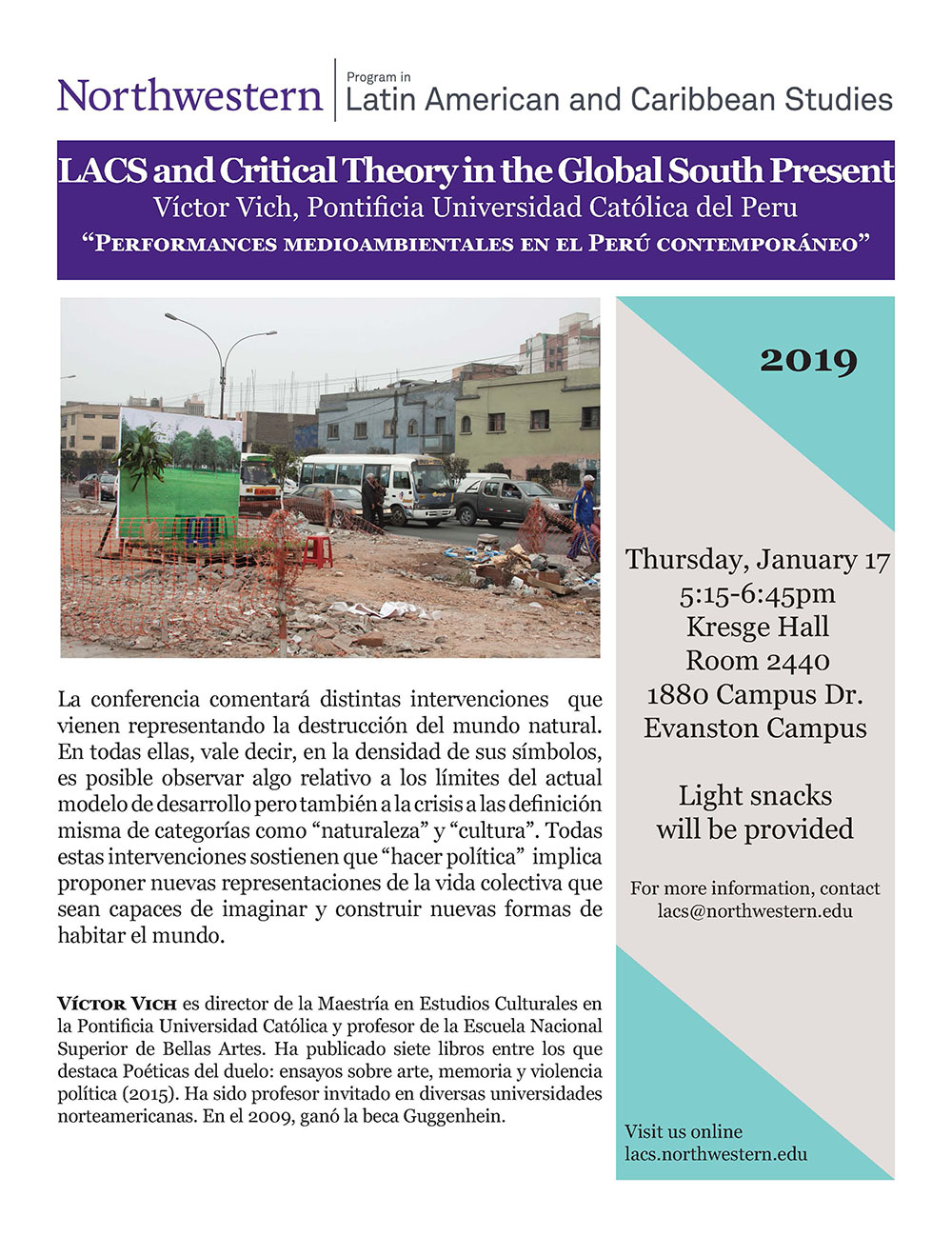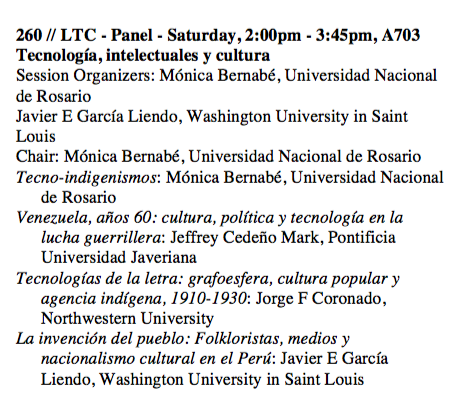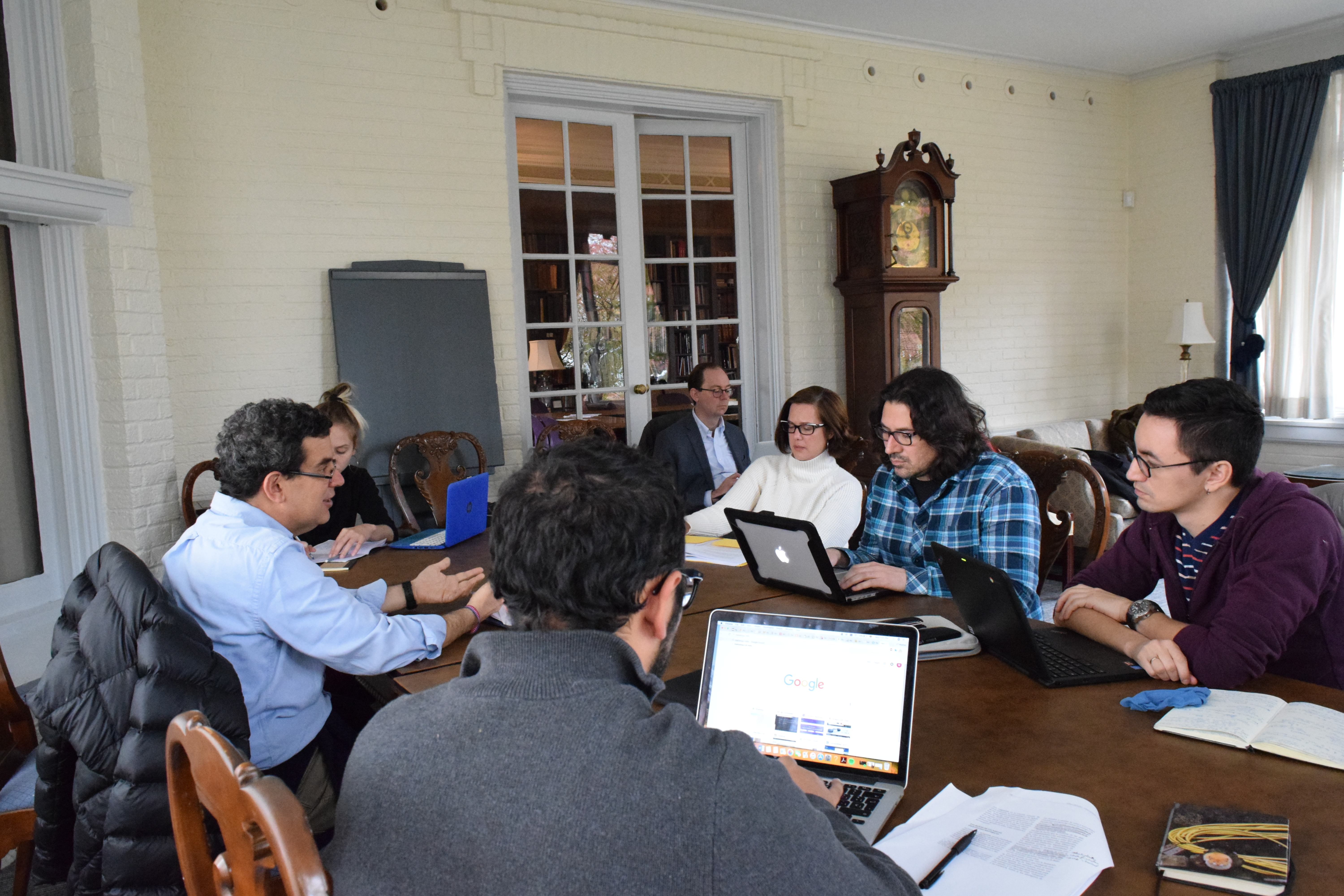Circulating Anarchisms and Marxisms in the Andes
The theme of this collaborative project between Víctor Vich (Pontificia Universidad Católica del Perú) and Jorge Coronado (Northwestern), has been the emergence of critical theory in the Andes region in the period 1890-1950, focusing on the creative transformations and adaptations of European Marxist and anarchist thought in this geopolitical context. The project will result in the publication of Antología de textos primarios: Anarquismos y marxismos en los Andes with Editorial Plural in La Paz. Edited by Jorge Coronado. The collaboration also included a graduate student exchange through the award of a Mellon predoctoral fellowship to support the participation of a graduate fellow based in Peru, to assist with the research for the course development during a visiting residency at Northwestern. The predoctoral fellowship was awarded to Sheyla Liliana Huyhua Muñoz.
Faculty
 Victor Vich is Professor at the Pontificia Universidad Católica del Perú (PUCP) in Lima, where he specializes in cultural theory and contemporary and literary culture in Peru. He is the author of numerous books, most recently Poéticas del duelo. Ensayos sobre arte, memoria y violencia política en el Perú (2015). He is the co-director of PUCP’s Maestría en Estudios Culturales (Master’s Degree in Cultural Studies), a leading program for training in cultural and critical theory.
Victor Vich is Professor at the Pontificia Universidad Católica del Perú (PUCP) in Lima, where he specializes in cultural theory and contemporary and literary culture in Peru. He is the author of numerous books, most recently Poéticas del duelo. Ensayos sobre arte, memoria y violencia política en el Perú (2015). He is the co-director of PUCP’s Maestría en Estudios Culturales (Master’s Degree in Cultural Studies), a leading program for training in cultural and critical theory.
Jorge Coronado is Professor of Spanish & Portuguese and Comparative  Literature at Northwestern. He is also Co-Director of the Andean Cultures and Histories Working Group at the Buffett Institute for Global Studies. A specialist in modern Latin American and Andean literatures and cultures, he is the author of The Andes Imagined: Indigenismo, Society, and Modernity (2009), as well as Portraits in the Andes: Photography and Agency, 1900-1950 (2018).
Literature at Northwestern. He is also Co-Director of the Andean Cultures and Histories Working Group at the Buffett Institute for Global Studies. A specialist in modern Latin American and Andean literatures and cultures, he is the author of The Andes Imagined: Indigenismo, Society, and Modernity (2009), as well as Portraits in the Andes: Photography and Agency, 1900-1950 (2018).
Visiting Predoctoral Fellow

Project Syllabi
- SPPO 480: Anarchisms and Marxisms in the Andes
- SPPO 420: Indigenismos and Indigeneities in Latin America
- SSPO 343: Latin American Avant-Gardes
Background Reading: Political Violence in Peru
Bonilla, Heraclio. "Sendero Luminoso en la encrucijada política del Perú." Nómadas 10, no. 2 (October 2003): 58-65.
Burt, Jo-Marie. Political Violence and the Authoritarian State in Peru: Silencing Civil Society. New York: Palgrave MacMillan, 2007.
Degregori, Carlos Iván y Elizabeth Jelin, eds. Jamás tan cerca arremetió lo lejos: memoria y violencia política en el Perú. Lima : Instituto de Estudios Peruanos, 2003.
Lázaro, Juan. "Women and Political Violence in Contemporary Peru." Dialectical Anthropology 15, no. 2 (1990): 233–247.
Schulte-Bockholt, Alfredo. Corruption as Power: Criminal Governance in Peru during the Fujimori Era (1990–2000). New York: Peter Lang AG, International Academic Publishers, 2013.
Vich, Víctor. "An Aesthetic Event: Ricardo Wiesse’s Cantutas and Political Violence in Peru." In Meanings of Violence in Contemporary Latin America, edited by Gabriela Polit Dueñas and María Helena Rueda, 167–181. New York: Palgrave Macmillan, 2011.
———. "Violence, Guilt, and Repetition: Alonso Cueto's Novel La Hora Azul." In Art from a Fractured Past, edited by Cynthia E. Milton, 127–138. Durham, Duke University Press, 2014.
Wilson, Fiona. Citizenship and Political Violence in Peru: An Andean Town, 1870s–1970s. New York: Palgrave MacMillan, 2013.
Background Reading: José Carlos Mariátegui
Coronado, Jorge. "The Revolutionary Indio: José Carlos Mariátegui’s Indigenismo." In The Andes Imagined: Indigenismo, Society, and Modernity, 25–51. Pittsburgh: University of Pittsburgh Press, 2009.
Izquierdo, Lucas. "Mariátegui, Pareto y Sorel: revisionismo o revolución decolonial." Revista de Estudios Hispanicos 49, no. 3 (October 2015): 549–569.
Mariátegui, José Carlos. "Defensa del marxismo," "Teoría y práctica de la reacción," "Biologia del fascismo," y "La revolución y la inteligencia." In Obras, tomo 1, selección de Francisco Baeza, 121–204, 205–224, 321–331, y 360–381. La Habana, Cuba: Casa de las Américas, 1982.
Mariátegui, José Carlos. "Esquema de la evolución económica" y "El problema de la tierra." En 7 ensayos de interpretación de la realidad peruana, 7–25 y 39–85. Lima: Amauta, 1984. (Translation available as "Outline of the Economic Evolution" and "The Problem of Land." In Seven Interpretive Essays on Peruvian Reality, translated by Marjory Urquidi, 3–21 and 31–76. Austin: University of Texas Press, 1971.)
———. "El problema de las razas en la América Latina." En Ideología y política, 21–99. Caracas: Ministerio de Comunicación y Información, 2006.
———. The Heroic and Creative Meaning of Socialism, translated by Michael Pearlman. Atlantic Highlands, NJ: Humanities Press, 1996.
Polar, Antonio Cornejo. "El indigenismo y las literaturas heterogéneas; su doble estatuto socio-cultural." Revista de Crítica Literaria Latinoamericana 4, no. 7–9 (1978): 7–21.
———. "Mariátegui y su propuesta de una modernidad de raíz andina." En José Carlos Mariátegui y los estudios latinoamericanos, editado por Mabel Moraña y Guido Podestá, 19–28. Pittsburgh: University of Pittsburgh, 2009.
Quijano, Aníbal. "Raza, etnia y nación en Mariátegui. Cuestiones preliminares." En Antología esencial. De la dependencia histórico estructural a la colonialidad/descolonialidad del poder, selección de Danilo Assis Clímaco, 757–775. Buenos Aires: Clacso, 2014.
Subirats, Eduardo. "Mariátegui, Latin American Socialism, and Asia." World Review of Political Economy 1, no. 3 (Fall 2010): 517-530.
Webber, Jeffrey. "The Indigenous Community as 'Living Organism': José Carlos Mariátegui, Romantic Marxism, and Extractive Capitalism in the Andes." Theory and Society 44, no. 6 (2015): 575-598.
News and Events
- Forthcoming in 2021
Editorial Plural in La Paz will publish Antología de textos primarios: Anarquismos y marxismos en los Andes. Edited by Jorge Coronado. - January 2019
Professor Victor Vich arrived at Northwestern on Monday, January 14th for nine days of collaborative meetings with Professor Jorge Coronado, Sheyla Liliana Huyhua Muñoz, and associated faculty members, graduate students, and undergraduate students. Professor Vich's visit to Northwestern will include delivering two guests lectures in Professor Coronado's graduate seminar, "Anarchisms and Marxisms in the Andes," as well as a public lecture on January 17th entitled “Performances medioambientales en el Perú contemporáneo.”

- October 2018
Visiting Predoctoral Fellow Sheyla Huyhua Muñoz has arrived at Northwestern and is working with Professor Coronado on the project syllabus. Welcome, Sheyla!
- August 2018
Professors Coronado and Vich's collaborative course is in development and will be offered through the Department of Spanish and Portuguese at Northwestern in the winter quarter of 2019. The course will investigate the shape that anarchist and Marxist thought took upon its contact with Andean societies through to its later development among various actors and at diverse sites, from 1890-1950. Course readings will be drawn from the work of a wide range of intellectual-activists, including José Carlos Mariátegui, César Vallejo, Raúl Haya de la Torre, and Manuel Seoane in Peru; Jorge Icaza, Enrique Gil Gilbert, Demetrio Aguilera Malta, Manuel Gustín Aguirre, and Joaquín Gallegos Lara in Ecuador; and Tristán Marof, Arturo Urquidi Morales, Gamaliel Churata, and José Antonio Arze in Bolivia, as well as texts by urban and indigenous activists such as Carlos Condorena, Ezequiel Urviola, Domitilia Pareja, and Luis Cusicanqui. - November 10–13, 2017 | Northwestern
Professor Vich visited Northwestern for "Transformations of Critical Theory," the inaugural workshop of the Critical Theory in the Global South Project. On November 13, he led a Spanish-language teach-in at Northwestern on the theme "Circulating Anarchisms and Marxisms in the Andes: A discussion of Marx and Mariátegui."
Professor Vich convenes his teach-in at Northwestern on Marx and Mariátegui - June 2017
Professors Coronado and Vich are currently designing their collaborative syllabi and deliberating over which pieces will be translated from Spanish into English. - May 27, 2017 | Pontificia Universidad Católica del Perú
Professor Coronado presented his paper "Tecnologías de la letra: grafoesfera, cultura popular y agencia indígena" at the 35th International Congress of the Latin American Studies Association.


